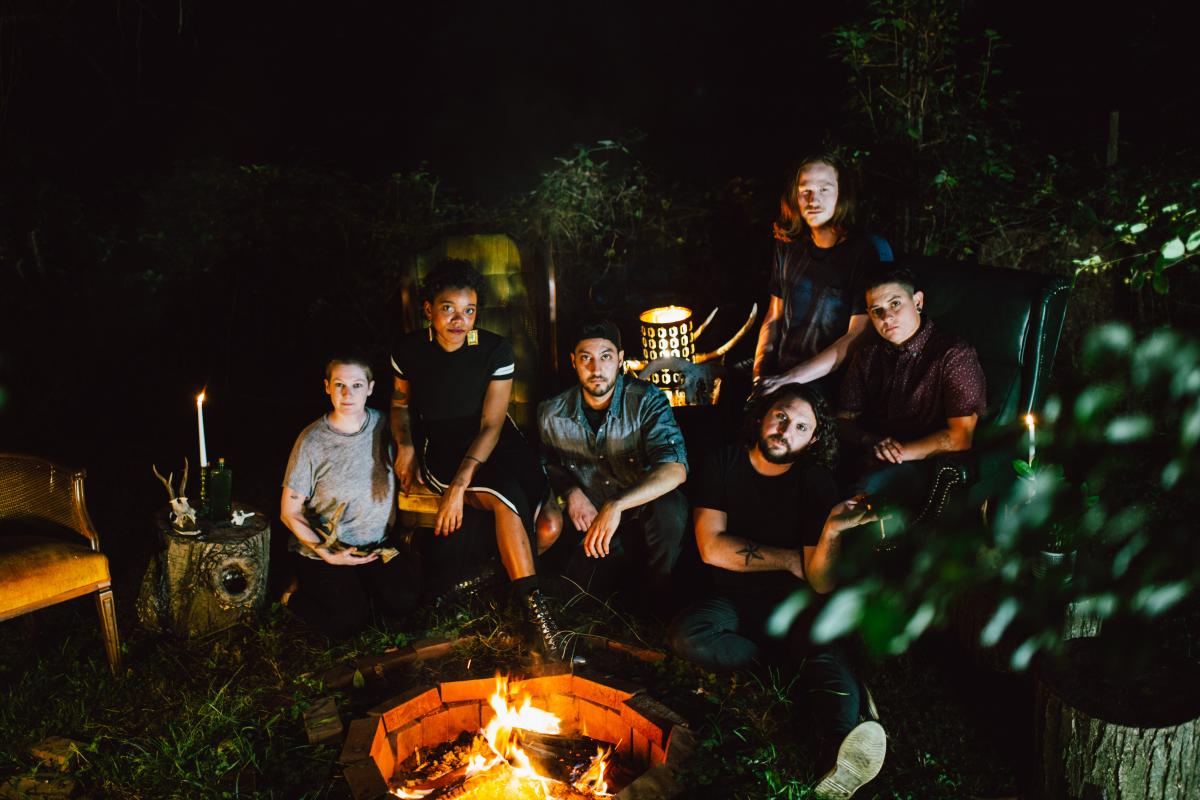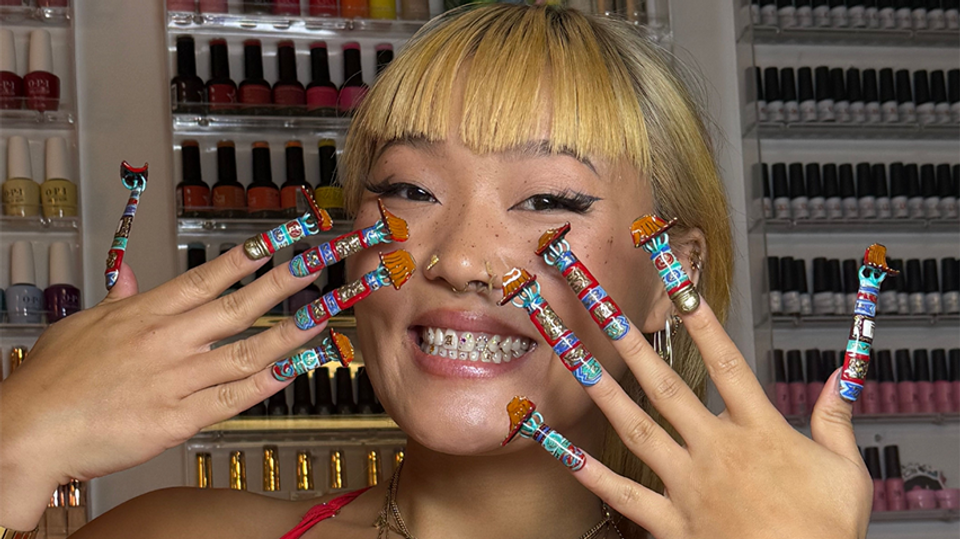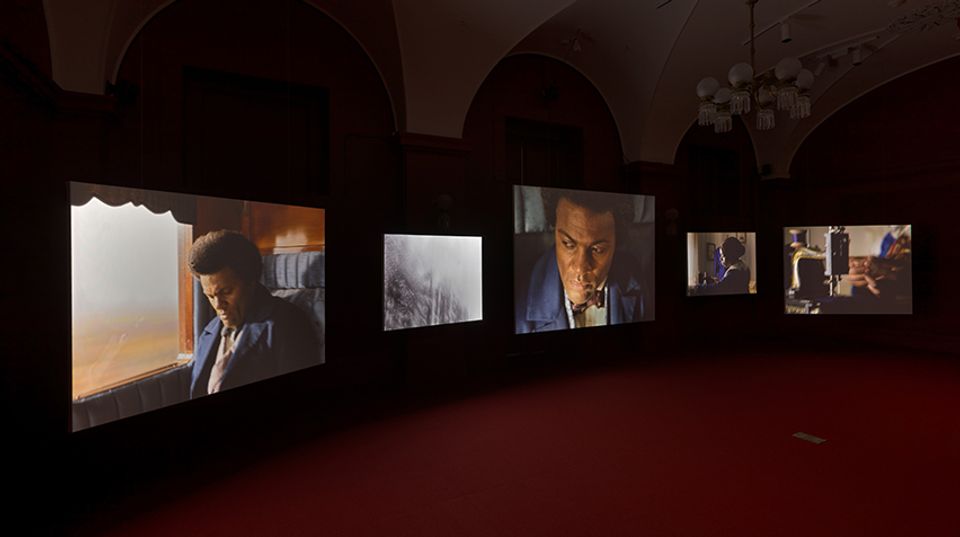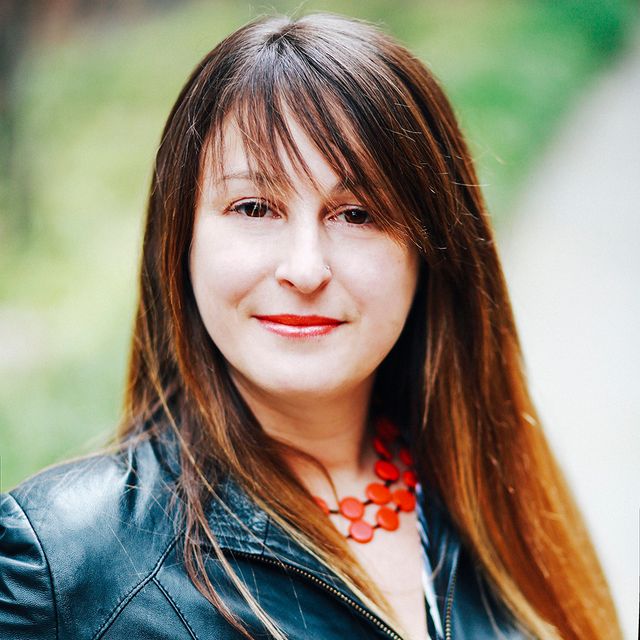From 2011 to 2020, SAAM hosted Luce Unplugged, a free, monthly concert series that celebrated the work of local musicians in its Luce Foundation Center. Since in-person events have been restricted during the pandemic, we teamed up with a local music podcast, Hometown Sounds, to continue to bring you music and conversations from your favorite DC artists. In our March episode, Hometown Sounds talks with Shady (vocalist), Frankie (bassist), and Beck (guitarist) of the six-person soulpunk group Lightmare. Lightmare's ability to blend the punchy, the political, and the personal into powerful, danceable music has quickly made it a staple of the DC music scene. To hear the full interview, visit hometownsoundsdc.com.
We know you got started as part of Girls Rock! DC’s Hat Band. Could you tell us about that experience and what made you realize that this was a combination of musicians that you wanted to keep going?
Shady: That story is such a wild origin story for us, because at this point, only half of the current members are the same as that original Hat Band. It was me, Vitamin Dee the keyboardist, and Matty K, the sax player. We didn't know each other at all, but we developed something interesting at our 15-minute performance at the Hat Band show. We decided to keep it going. Beck and Frankie joined the band later.
During normal times, the essential activities of being in a band include working on new music together, rehearsing, playing shows, going to shows, recording, and touring. How has Lightmare retained a shared experience as a band during the pandemic?
Frankie: In the beginning, we were supposed to record our album and that clearly got put on hold. We all were like, okay, we'll take a break from each other for a month. Then month one turned into month two. We can't stop being Lightmare. I have a very large backyard and we started playing outside, which was a great relief for our neighbors. Everybody in the neighborhood would come out and enjoy it. I've been in a lot of small bands before, and communication was always tumultuous, but surprisingly everybody was on the same page in this particular six-piece band. We just did what we had to do. We podded together, we practiced outside, and we played a bunch of virtual shows. And we were able to finally record this album.
Shady: We made sure to be careful about safety, because we do care about one another a lot.
Beck: I think we were blessed to continue collaborating while the weather was warm and eventually put a pretty fantastic record together. Once we passed that milestone, we looked around and agreed that we could hit the pause button for a little bit.
Many, many people are very excited for your new album to come out. What has been your experience making this album and how hard is it to write songs as a group of six people?
Shady: Recording the album was probably the dreamiest state of being you could ask for. We recorded our upcoming album, Dirt, at Tonal Park. They took such good care of us. They had lots of jazzy equipment that we didn't have on our own. In true Lightmare fashion, we knocked that whole recording out in a weekend. We have an inside joke that whenever somebody leaves for a bathroom break or a smoke break, we write three songs. The writing process just happens so quickly and naturally.
How do your personal identities and your DC music communities contribute to your songwriting and your creative process?
Shady: I'm a DC native. I grew up in this city, which has an incredibly rich musical history and tradition. Many of the greats either started or came through here and changed the landscape of music in the country forever. I grew up absorbing that legacy through my pores and I think that's one of my huge identity pillars. So many people that come to DC think it's just a politician and policy wonk city and forget about the art, the history, and the culture. Part of me feels like it's my special duty as a queer black person who is a DC native, to carry that legacy on and transform it.
When we're writing music together as a band, I feel grateful for my bandmates who have dedicated themselves to the practice of seeing other people for who they are and meeting people where they're at. We end up with a really well-informed sense of one another. We talk about more than music. We talk about our mental health challenges, our dating lives, work challenges, politics, history, and culture. It all continuously informs what we do together.
You did an outdoor show at Rhizome last fall and an online show as part of a fundraiser for the National Independent Venue Association in December. How were those experiences different from pre-pandemic performances? Were there any unexpected silver linings?
Beck: The Rhizome show was outside and socially distanced. We've played at Rhizome a fair amount of times, and I associate that space with a very close, tight, rubbing elbows sort of affair. It's sweaty, hot, and very intense, but in the best possible way. To go from that experience to outdoors, during the daytime with a lot of space, it's the polar opposite. That's not a bad thing, it's just different. That goes along with everything about making music during this pandemic, it's just something you have to adapt to. You are coming up with this ad hoc stage setup and people are figuring it out as they go along. Luckily for us, it’s been a pretty smooth process.
Frankie: My takeaway from the pandemic, as a musician who is also in a band is we are all still doing it. We’re all still here and finding ways of connecting. I think that's the best part about being an artist, you persevere through the hardships and go through the darkness, and you create constantly no matter what that takes. You find people that are doing the things that you're doing. Life doesn't stop and neither does art.
What does the future hold for Lightmare? We've teased the upcoming album. What plans do you have for it? What should people be on the lookout for?
Shady: We are releasing our new album, Dirt, in a couple of months, with the nonprofit record label, This Could Go Boom! It's a 13-track album that has a lot of hills and valleys emotionally. If you liked our previous album, this album is for you.
Beck: Dirt is the name of one of the oldest songs on the album. It serves as a bedrock, a foundation, a sediment, if you will. Dirt is nourishing and it promotes growth. I think it's a fitting name for an album where we're talking about all these different topics. We're talking about growth. We’re talking about the future. We're talking about the fraughtness and the beauty of interpersonal relationships. All of that together is churning around in the dirt, waiting patiently.
Shady: You can expect this album to come out sometime in June. It'll be available everywhere, except Amazon. You can find us on Facebook. You can check us out on LightmareDC.com. We're on Instagram as Lightmare DC, the same for Twitter. We're on all streaming sites: Spotify, Bandcamp, and Tidal. You can also buy our album through Bandcamp.
Luce Listening Party with Lightmare drops Friday, March 26.



















